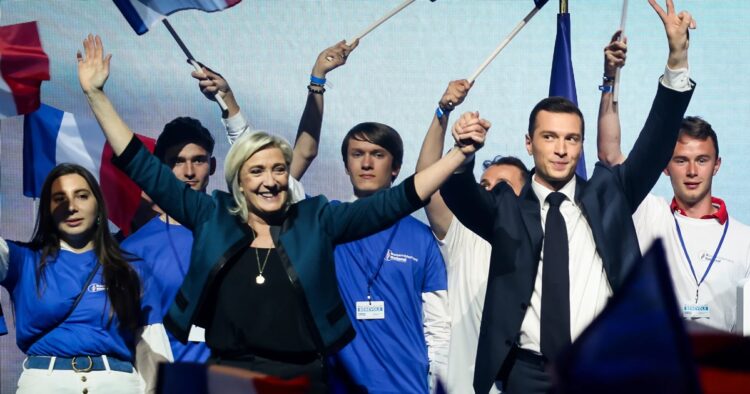Marine Le Pen, a prominent French political leader, is not running in this weekend’s European Parliament elections, but her party, the National Rally, is predicted to be the top vote-getter in France. This would be a significant victory over President Emmanuel Macron’s moderate pro-business party.
Le Pen’s party promotes anti-immigration and nationalist ideas, which are gaining popularity across Europe. The June 6-9 elections in all 27 EU countries are expected to shift the European Parliament and the European Commission, the EU’s executive arm, towards the right. This could have a lasting impact on the EU and increase Le Pen’s chances of winning the French presidency in 2027.

Jordan Bardella, the National Rally’s lead candidate for the European Parliament, is campaigning on promises to limit the movement of migrants within the EU, reduce EU pressure on Russia, and ease EU climate rules. He advocates for rethinking the European model to focus more on national sovereignty. Bardella stated at a rally in Paris that Macron’s vision for Europe is outdated.
Meanwhile, Macron’s pro-EU movement is struggling. Valerie Hayer, the chief candidate, has had difficulty gaining traction. This is concerning for Macron, who is leading efforts to support Ukraine and strengthen the EU’s defenses and industries.
Prime Minister Gabriel Attal has joined Hayer at rallies, warning voters that European unity and democracy are at risk due to rising authoritarianism. He emphasized that Europe must protect itself, especially with ongoing challenges like climate change and technological advancements.
In France, many voters are using the European Parliament elections to express their dissatisfaction with Macron’s handling of various issues, including the economy, agriculture, and security, particularly with the upcoming Paris Olympics.
On the left, the Socialist Party is experiencing a resurgence. Their lead candidate, Raphael Glucksmann, is advocating for more ambitious climate policies and better protections for European businesses and workers.
Macron’s rise to power in 2017 disrupted France’s traditional Socialist and conservative parties by positioning himself in the political center.
However, left-wing voters are now frustrated with Macron’s tough security and immigration policies and the far-left France Unbowed party’s strong pro-Palestinian stance, pushing some back toward the Socialists.
ALSO READ: “Bharat And France To Start Negotiations In Mega Rs 50,000 Crore 26 Rafale Deal”
Glucksmann highlighted the importance of environmental transformation in achieving energy independence. He argued that while other countries might cut gas or oil supplies, renewable energy sources like wind and solar are reliable.
Le Pen, who was runner-up to Macron in the last two presidential elections, is expected to benefit the most from France’s protest vote, as her party did in the 2019 EU elections. Although she no longer advocates for France to leave the EU and the euro, she aims to reduce the EU’s powers and reform it from within.
Le Pen told her supporters that national parties across Europe are rising not to destroy the EU but to build a European alliance of nations capable of addressing the industrial, environmental, migratory, and technological challenges of the 21st century.
Le Pen concluded by expressing confidence that her party and similar movements across Europe are winning the political battle.

















Comments